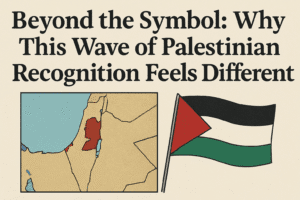Beyond the Symbol: Why This Wave of Palestinian Recognition Feels Different
A wave of Western nations, including the UK and France, plans to recognize a Palestinian state at the UN, marking a significant diplomatic shift fueled by the war in Gaza. This move is intended as more than symbolism; it’s designed to create tangible pressure on Israel to end its assault and halt settlement expansion. Proponents see it as a “starting gun” for a urgent sprint toward a two-state solution, with the UK’s role carrying deep historical weight. However, the initiative faces fierce opposition from Israel’s government, which views it as rewarding terrorism and rejects Palestinian sovereignty.
The recognition effort aims to alter the cost-benefit analysis of the status quo by leveraging international legal and diplomatic weight. Ultimately, this collective action represents a crucial test of whether diplomatic momentum can overcome entrenched facts on the ground and revive a dormant peace process.

Beyond the Symbol: Why This Wave of Palestinian Recognition Feels Different
For decades, the “two-state solution” has been a diplomatic mantra, repeated so often it risked becoming background noise to a conflict that only seemed to intensify. The map of the Middle East has remained stubbornly unchanged, even as the facts on the ground—through settlements, walls, and repeated cycles of violence—made the concept feel increasingly theoretical.
But this month, something significant is shifting. The decision by several major Western nations—including the UK, France, Canada, and Australia—to formally recognize a Palestinian state at the UN General Assembly is more than a symbolic gesture. It represents a fundamental recalibration of international diplomacy and, potentially, the most concrete push for a two-state reality in a generation.
The Starting Gun for a Sprint
As Husam Zomlot, the head of the Palestinian Mission in London, aptly put it, this isn’t expected to be a leisurely “march” but a “sprint” toward implementation. This sense of urgency stems from a profound global exasperation. The horrific human cost of the war in Gaza has acted as a catalyst, forcing capitals worldwide to move beyond statements of concern and toward tangible diplomatic action.
The UK’s potential involvement is particularly historically resonant. It was the British Balfour Declaration of 1917 that first endorsed a “national home for the Jewish people in Palestine.” For a British government to now help define the borders of a Palestinian state alongside Israel is seen by many as closing a historical loop, adding a layer of poetic justice to the political move.
More Than a Gesture: The Mechanics of Pressure
Skepticism is natural. Critics rightly ask: does recognition change anything for a farmer in Jenin or a family in Sderot? On its own, perhaps not. But this wave of recognition is designed to work as a key that unlocks other mechanisms of pressure:
- Legal Reinforcement: The 2024 ruling by the UN’s highest court that Israel’s occupation and settlements are illegal provides a powerful legal backbone. Widespread recognition strengthens the case for enforcing this ruling in other international forums.
- Economic and Diplomatic Leverage: Recognition can pave the way for greater economic support and more formal diplomatic channels for a future Palestinian state, altering its standing in the global community.
- Isolating the Extremes: The unified move is a clear message to the Israeli government that its current trajectory—particularly the expansion of settlements—is incompatible with its allies’ vision for long-term security and peace. Simultaneously, it offers a diplomatic victory to the Palestinian Authority, aiming to bolster moderate leadership over extremist groups like Hamas.
The Immovable Object: Israel’s Stance and the Road Ahead
The greatest obstacle remains the firm opposition of Israel’s current government, which flatly rejects a sovereign Palestinian state. Israel views these recognition moves as a “reward for terrorism” following the October 7th attacks, a grievous wound that is still fresh in the national psyche. Officially, Israel considers the West Bank “disputed” rather than “occupied” territory, citing ancient historical and biblical ties.
This creates the central tension: the international community is attempting to build a new reality through diplomacy, while the facts being built on the ground point in a different direction. The hope among diplomats is that this collective pressure will be sufficient to alter the cost-benefit analysis for Israel, making the status quo less tenable than a negotiated peace.
A Final Crossroads
The true value of this moment lies not in the recognition itself, but in the door it pushes open. It is a deliberate, coordinated attempt to break a paralyzing status quo and reanimate a solution that many had written off as dead.
The path forward remains fraught. It will require not just pressure on Israel, but also immense work to ensure a future Palestinian state is governable, unified, and a genuine partner for peace. The sprint has been called, but the track is littered with obstacles.
Yet, for the first time in many years, there is a palpable sense that the diplomatic landscape is moving. Whether this momentum leads to a lasting peace or simply a new phase of confrontation depends on what the world chooses to do in the moments immediately after the starting gun fires.
You must be logged in to post a comment.